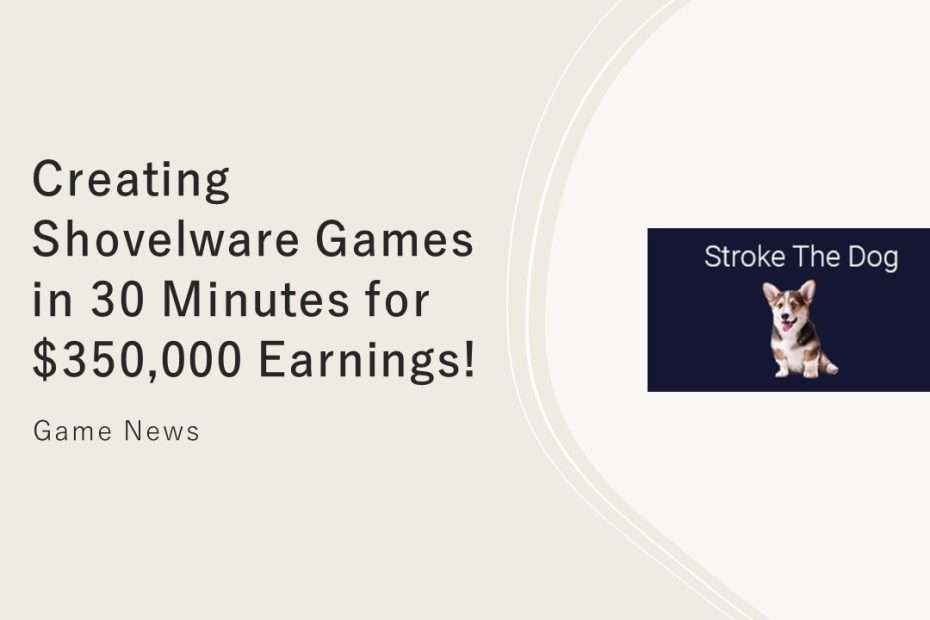Today, the gaming industry boasts some of the most expensive productions, surpassing even blockbuster movies with budgets stretching into the hundred-million-dollar range. Typically, game development projects span several years from conception to release. However, the notion of a self-taught programmer churning out a series of “games” in just 30 minutes each, and amassing over $350,000 in earnings may seem unfathomable, yet it’s a reality.
Despite the conventional wisdom surrounding game development timelines and costs, this remarkable feat challenges the norm. It underscores the potential for unconventional approaches and highlights the lucrative opportunities that exist within the gaming market. This story serves as an inspiring example of how innovation and ingenuity can lead to extraordinary success, even in the face of skepticism.
TJ Gardner is the mastermind behind Stroke games, which are accessible for download on the PlayStation Store. These games are characterized by an exceptionally straightforward premise: players are presented with a static image of the specific animal the title revolves around, overlaid against a blue backdrop.
In TJ Gardner’s Stroke games, a simple yet engaging mechanic captivates players: pressing the X button increments the “Strokes” count displayed in the corner by one, causing a brief flash of the animal depicted on the screen. As players accumulate strokes, they unlock achievements, with milestones such as reaching 25 strokes earning them a bronze trophy, and additional rewards for surpassing other benchmarks. Notably, achieving 2,000 strokes unlocks the prestigious platinum award, indicating a significant level of dedication and persistence.
Gardner’s games, highlighted in a story about his work, notably lack animations or sound effects. Even the music, described as lo-fi acoustic beats, continuously loops in the background. Despite the absence of traditional multimedia elements, Gardner’s games offer a unique appeal through their minimalist approach to design and gameplay mechanics. Interestingly, the images featured in Gardner’s games are sourced from a Creative Commons license available on Wikipedia.
Despite their seemingly basic premise and modest price tag of $3.99 (currently discounted to $2.79), Gardner’s games have surprisingly generated over $350,000 in revenue. Launched in September 2022, they have garnered more than 120,000 downloads, translating into a substantial pre-tax profit of nearly $240,000 for Gardner after Sony’s 30% commission is deducted.
The success of Gardner’s games underscores the potential profitability of niche offerings within the gaming market. Despite initial perceptions of quality, the significant revenue and download figures highlight the demand for unique and unconventional gaming experiences.
Gardner candidly reveals that the initial game creation process was time-consuming, with the first game demanding approximately seven to eight hours of work. However, subsequent titles, such as “Stroke the Beaver“, were developed much more efficiently, requiring only around half an hour of his time.
The Stroke games, unlike traditional incremental games like Cookie Clicker, primarily target Achievement/Trophy collectors, a niche audience that values accumulating virtual rewards. In contrast to the simple mechanics of many popular titles, Gardner’s creations are tailored to appeal specifically to this demographic, leveraging the allure of achievements to drive engagement and sales. The prevalence of simplistic games on the PlayStation Store, which often offer easy trophies, served as a catalyst for Gardner’s decision to delve into game development. Learning coding skills primarily through online resources like YouTube tutorials, he recognized the lucrative potential of catering to Achievement/Trophy hunters and seized the opportunity to capitalize on this growing market trend.
Gardner discovered that navigating Sony’s quality assurance process was surprisingly straightforward, providing him with easy access to publish Stroke the Dog on the PlayStation Store. This initial success encouraged him to further explore the platform’s potential, leading to the creation and release of additional titles featuring various animals, each with its own unique twist or variation.

Gardner’s assortment of Stroke games extends beyond the unconventional premise of beaver stroking to encompass titles like Stroke the Dik-Dik. This particular game focuses on the Dik-Dik, which refers to any of the four species of small antelopes belonging to the genus Madoqua. Gardner’s inclusion of this distinct animal reflects his penchant for incorporating lesser-known or unconventional subjects into his gaming repertoire, further diversifying his portfolio and catering to a niche audience interested in unique experiences.
While Gardner openly acknowledges that his games fall into the category of shovelware, not all observers view his success positively, with some expressing concern over what they perceive as exploitation of the system. Despite this criticism, Gardner reveals a surprising statistic: out of the 11,105 individuals who purchased Stroke the Hamster, merely 10 have sought refunds. This statistic suggests that, despite their simplistic nature, Gardner’s games have resonated with a significant portion of the gaming community, contributing to their substantial sales figures and overall success.
Despite Sony’s purported crackdown on shovelware and games designed to appeal primarily to trophy hunters, its store remains inundated with such titles. The irony lies in the fact that while Sony has threatened to remove these games and the publisher accounts associated with them, the significant revenue generated from Gardner’s creations, totaling $101,000, may have influenced Sony’s leniency in enforcing these policies. This suggests that financial considerations may outweigh concerns regarding the quality or integrity of the games available on the platform.
Meanwhile, Gardner himself is transitioning towards other projects that diverge from the shovelware genre. This move indicates a shift in his focus and perhaps reflects a desire to explore different avenues within game development. By venturing into non-shovelware projects, Gardner demonstrates a willingness to evolve as a developer and explore new creative territories beyond the realm of simplistic, achievement-oriented games.
Maybe you liked other interesting articles?

